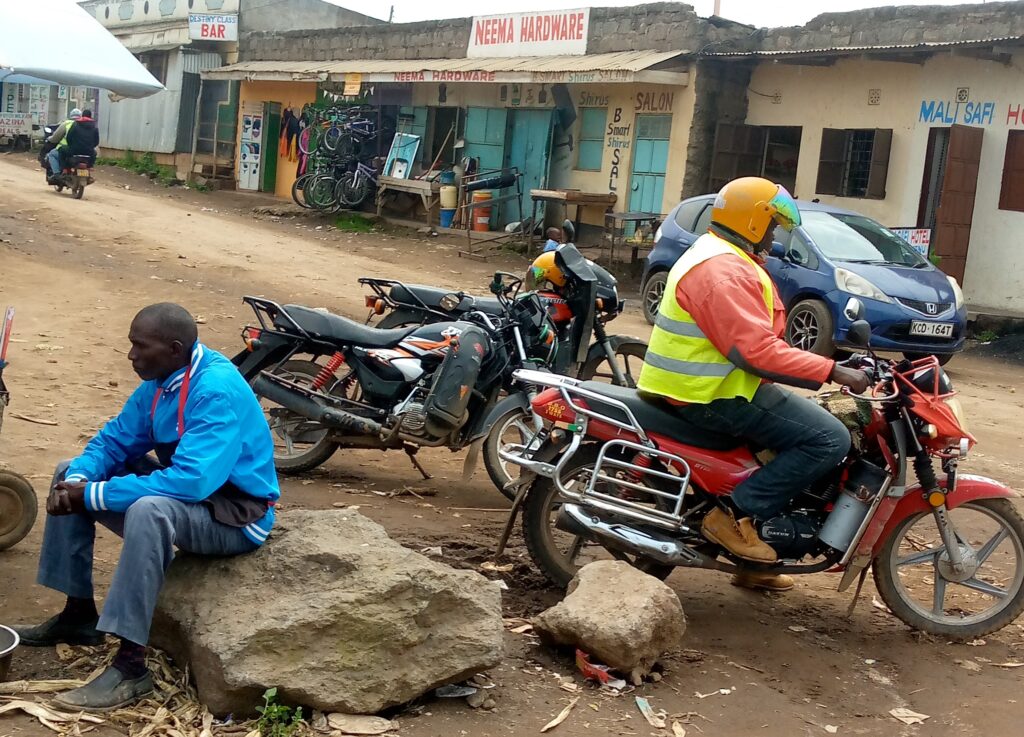Feature: Boda boda
Motor-cycle operators popularly known as boda boda in Kenya is a multi-million-shilling industry. According to a report by the World Bank, the boda boda industry in Kenya employs an estimated 1.5 million people and contributes about Sh202 billion ($1.8 billion) to the economy annually. The industry contributes 3.4 percent of Kenya’s Gross Domestic Product (GDP).
Boda-Boda derives its name from an English word ‘porter’, originally used to refer to human caravans who transported goods between Uganda and Kenya.
Since it was introduced in Busia in 1988, these motorbike and bicycle taxis have spread to several towns in Uganda, and gradually throughout East Africa, Central Africa and West Africa.
When the late President Mwai KIbaki ascended to power in 2003, he reduced taxes on import of motor-cycle and motor-cycle parts thus revolutionizing the motorcycle taxi industry because it was at this time that this industry grew in leaps and bounds in Kenya, making it a source of income for many.
A boda boda operator makes an average of Sh1,000 per day from an average of 15 rides. In Gilgil area in Nakuru County, a boda boda Self-Help group is changing the lives of its’ members, literally. By a small daily contribution of Sh50, members are making strides and changing their lives.
A boda boda operators’ cooperative established three years ago in Gilgil Town has become an inspiration by significantly improving the lives of its members by enabling 25 of its members to own plots in Langalanga area, Gilgil. Three Ways Boda – boda Self Help Group has 40 members and carries out the three projects which their members can choose to participate in.

Members of the Three-Ways Boda Boda Self-Help Group in Gilgil town going about their business.
According to Andrew Oroba, the chairman of Three Ways group, the group was established with an aim of curbing the many challenges that are experienced by motorcycle operators such as road accidents, personal health related emergencies or death of close relatives.
“The many challenges faced by boda boda riders motivated us to come together and support each other. We also wanted to come up with something that will unify us and at the same time benefit all of us,” Oroba says. Oroba remembers how he noticed that majority of his friends in the bodaboda sector were earning much and yet they had nothing to show for it at the end of the day, and that became his main inspiration to form the group.
After saving for some time, some of the group members proposed that they purchase a two- acre land in the area that was worth Sh2 million and divide it among the members who had contributed to the scheme.
“We saw that if we can come together, think and act on this issue, we can certainly acquire the land. So at first we decided to start contributing Sh50 each daily before upgrading to Sh200 until we managed to purchase the land within a span of two years,” Oroba says.
Oroba reveals that so far 25 members already own a plot and they are in a process of completing purchase of an additional 2 acres of land in the same vicinity of the land purchased earlier for their members. “One acre of land holds around eight quarter-acre plots and we needed more land for each member to own a property,” noted Oroba.
Oroba also states that since majority of the members are parents and they used to face financial challenges especially at the beginning of academic terms, to counter this, they decided to form a saving and loans project that will enable members to save and take loans at a lower interest rate. Every member is therefore expected to contribute Sh50 daily to be deposited in the bank as a share and this money is loaned to any member who has an emergency issue.
Another project carried out by Three Ways Sacco group is welfare which not only supports members who are admitted to hospital or have lost a loved one, but has enabled all of them to register for the National Health Insurance Fund (NHIF) cover through another daily contribution of Sh50.
Thirty -year -old Wilfred Nyamari, one of the boda-boda riders from Gilgil is very ecstatic to be a member of the group stating how he never imagined owning a parcel of land in another county apart from his hometown while still young from the bodaboda business.
“I come from Nyamira, Kisii County and I am a father of three children. After high school I couldn’t manage to continue with my studies and decided to follow a relative to Gilgil in search of greener pastures. That’s how I landed in boda boda business, and now imagine I own a plot at Langalanga because of this group,” said Nyamari.
According to Oroba, the main challenge faced by the group is when some members take loans and fail to pay the loans on time. There are also members who lose hope sometimes because of the hard economic times and want to opt out of the Sacco from the daily contribution but they keep on encouraging them to hold on.
Oroba hopes that that their self-help group will one day grow to be a matatu business, where every member of the group will own a public transport vehicle, plying different routes in the country, and indeed where there is a will there is a way.